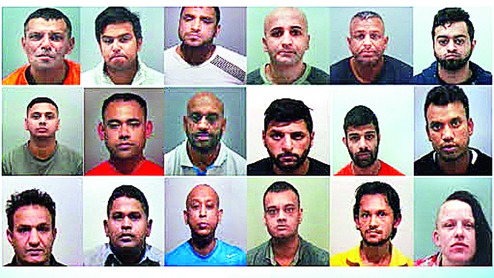
London, Aug. 13: Pakistani grooming gangs that target vulnerable white girls for sexual abuse are causing a huge problem for Indians because of the way the court cases are reported.
The gangs are described invariably by newspapers as "Asian", a term which normally takes in Indians, Pakistanis and Bangladeshis.
While the term is perfectly acceptable in most contexts, especially when people from the subcontinent have to put up a common front when confronting racism, it does cause difficulty in grooming cases where the vast majority of perpetrators are Pakistani.
The latest grooming case, which has ended with the conviction of a 17-member gang, consisting mainly of Pakistanis, has provoked a fierce debate in Britain.
Some Conservative MPs have questioned why the apparently racially aggravated nature of their offences was not taken into account when gang members were sentenced.
Solicitor-general Robert Buckland appeared to agree. "The law does not discriminate. When it talks about sentencing increases for racial aggravation it doesn't cut one way, it cuts all ways. Where there is a racial element in sexual abuse cases the law is clear that courts can apply a sentencing uplift. Racial aggravation should be front and centre in cases where there is evidence or racial hostility or motivation," he told The Daily Telegraph yesterday.
The trials in Newcastle had followed a number of similar cases in Rotherham, Oxford and elsewhere and Buckland expressed concern that fears of being accused of racism may have deterred the authorities from adopting a tougher approach.
"There has been an institutional reticence when it comes to Asian gangs that groom and abuse white girls," he said. "Some people have been more concerned about being labelled racist than dealing with child safeguarding."
Some Pakistani women have revealed that the men got away with abusing women in their own communities and, emboldened, went "broader".
As to why Pakistani men are disproportionately involved in picking up underage girls, plying them with drinks and drugs and the passing them round for group rape has not been explained satisfactorily by anyone so far.
This is an area where Indians do not wish to be lumped with Pakistanis as "Asians" but many do not wish to be divisive either. This is a dilemma for which there appears to be no obvious solution.
Sir Trevor Phillips, who was chairman of the Commission for Racial Equality and of its successor body, the Commission for Equality and Human Rights, suggested yesterday that describing these gangs as Asian wrongly points the finger at ethnic groups like Indian Hindus who have not been implicated.
He wrote in The Daily Telegraph: "What the perpetrators have in common is their proclaimed faith. They are Muslims, and many of them would claim to be practising. It is not Islamophobic to point this out, any more than it would be racist to point out that the most active persecutors of LGBT people come from countries where most people are, like me, black."
It is unlikely his suggestion will be taken up. Innocent Pakistanis already suffer since home-grown terrorists in Britain come disproportionately from the Pakistani- and Bangladeshi-origin populations. Again the word "Asian" makes Indians resentful.
Imam Qari Asim, of the Makkah mosque in Leeds, commented: "We cannot hide from the fact that the perpetrators of these appalling crimes were mostly Muslims. If it is cultural prejudices that have led these men to prey on white girls, seeing them as 'easy meat', then this needs to be addressed. There can be no excuse if members of the British Pakistani community are aware of people exploiting children and young girls and not reporting the wrongdoers."
Dealing with grooming falls to the home secretary, Amber Rudd, who labelled the Newcastle trial "an abhorrent case of sexual predators preying on young women and girls". The exploitation of young girls, she declared, was a "sickening crime".
But she added: "Those responsible are not restricted to any single ethnic group, religion or community. It is an affront to everyone in our society and I want to be absolutely clear that political and cultural sensitivities must never be allowed to get in the way of preventing and uncovering it."










